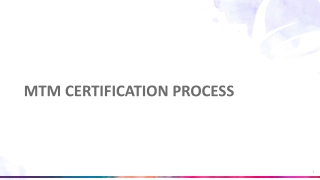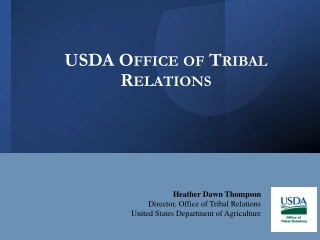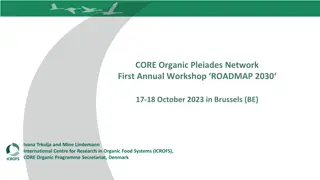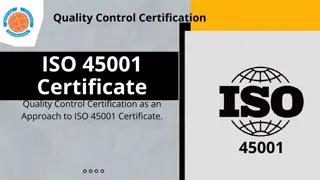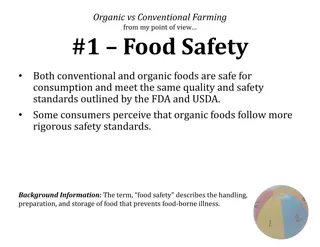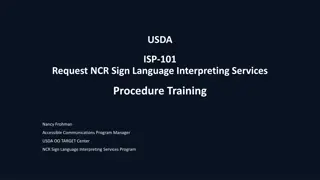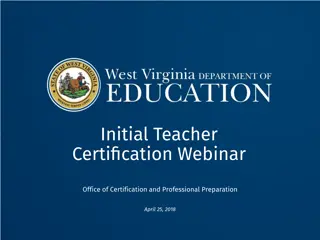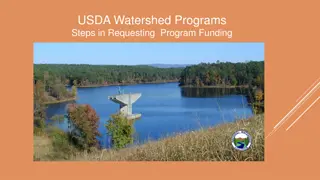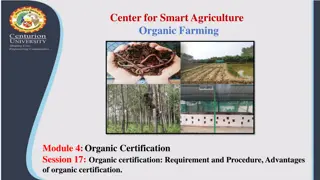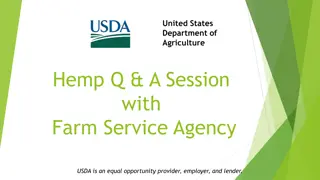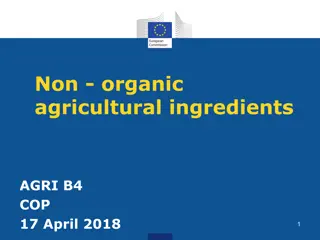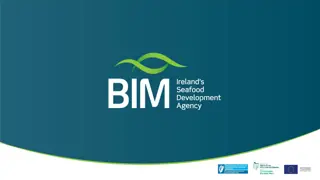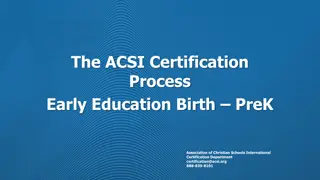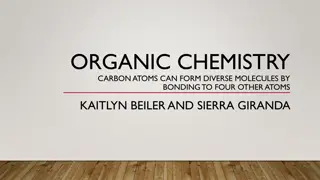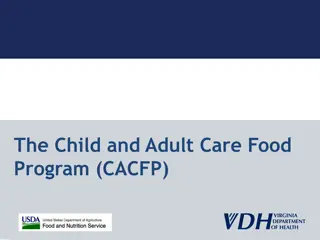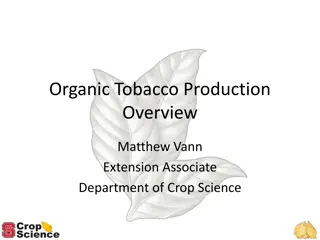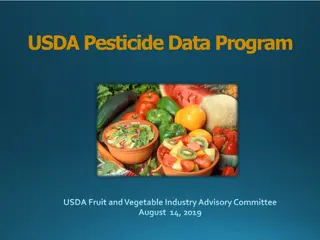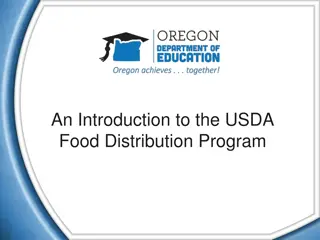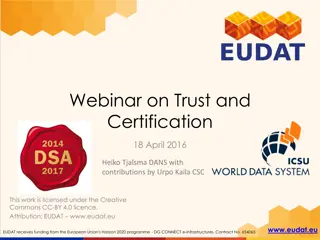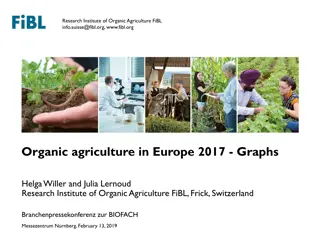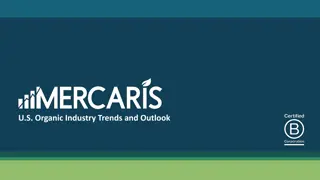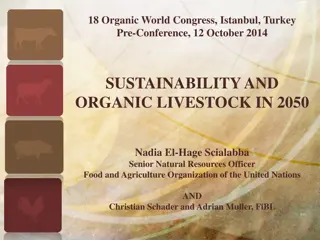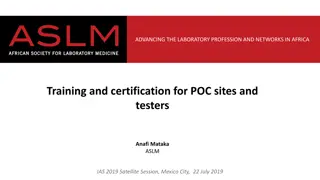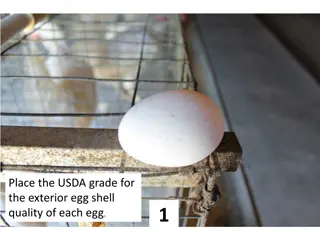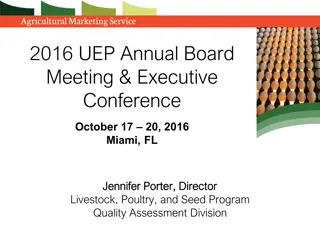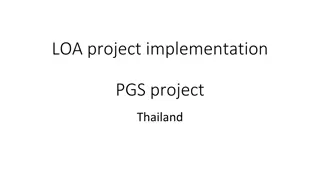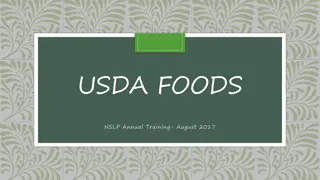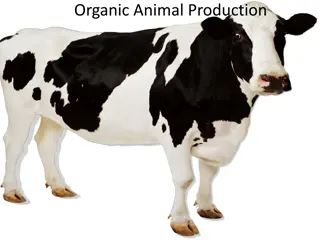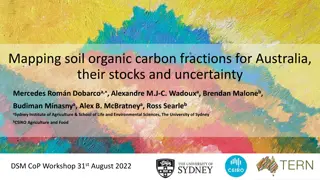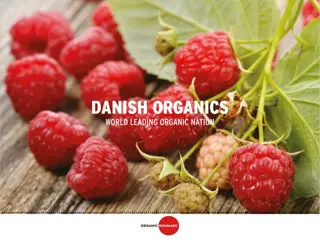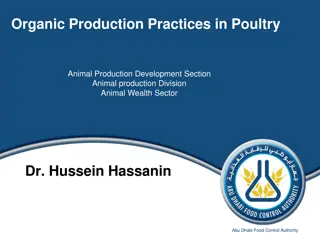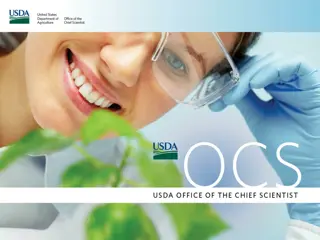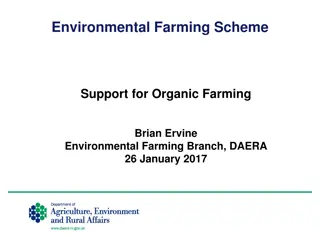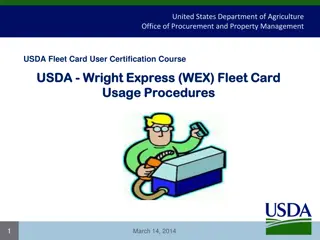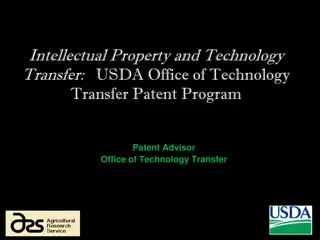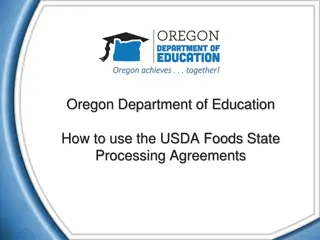MTM Certification Process
Market and Area Coaches review roles, responsibilities, and certification process with potential Market Training Managers. Certification is through a 3-step process. Training Certification signed by Area Coach, Market Coach, and Training Team. Performance measured against standards. Repeated failure
5 views • 5 slides
USDA Tribal Relations and Federal Policy in Native Agriculture
Explore the role of the USDA Office of Tribal Relations and the USDA Tribal Advisory Committee in addressing barriers and federal policies impacting tribal agriculture. Learn about tribal eligibility, statutory requirements, and the historical eras of federal Indian policy affecting Native American
0 views • 36 slides
USDA Accessible Communications Program Overview
Advancing access and equity for individuals with disabilities is a key focus of the USDA Accessible Communications Program. Through initiatives like the National Disability Employment Awareness Month events and implementing the Rehabilitation Act, the program aims to promote accessible communication
5 views • 28 slides
CORE Organic Pleiades Network First Annual Workshop Roadmap 2030 - Event Recap
The CORE Organic Pleiades Network held its first annual workshop in Brussels, focusing on organic research and innovation in the European agri-food sector. The event discussed HEU partnerships, national/regional action plans, research funding, and more. CORE Organic aims to enhance knowledge and inn
0 views • 37 slides
Effective USDA Foods Procurement and Forecasting Strategies
Managing USDA Foods procurement involves analyzing historical data, estimating future trends, and streamlining menu planning to save time and reduce costs. Standardized recipes and inventory management are crucial for efficient operations. Understanding the location and value of USDA Foods, along wi
8 views • 11 slides
ISO 45001 Certificate | Quality Control Certification
Quality Control Certification makes security a seamless journey with the ISO 45001 certificate. Quality Control certification can help you take security off autopilot with ISO 45001. This streamlined standard creates a self-sufficient security system that runs smoothly in the background. QC certific
3 views • 5 slides
Transforming Buildings with EDGE Certification
Discover how EDGE certification revolutionizes the way buildings are designed and constructed for a smarter, greener world. EDGE provides a comprehensive solution that makes building green faster, easier, and more affordable. Learn about the EDGE standard's focus on resource efficiency, materials, e
1 views • 17 slides
Organic vs Conventional Farming: An Overview
In the debate between organic and conventional farming, both methods have their pros and cons. While organic foods are perceived to follow stricter safety standards, both types meet FDA and USDA regulations. They offer similar nutritional value, but organic farming tends to have lower efficiency due
0 views • 6 slides
USDA In-Person Sign Language Interpreting Services Training Overview
This training session provides essential information for USDA employees on requesting in-person and virtual sign language interpreting services in the National Capital Region. It covers policy reviews, training completion, requesting procedures, and resources available through the USDA NCR Sign Lang
0 views • 23 slides
Initial Teacher Certification Webinar Overview
This content provides detailed information about an Initial Teacher Certification Webinar hosted by the Office of Certification and Professional Preparation on April 25, 2018. It covers various topics including certification applications, renewal procedures, adding endorsements, TeachWV.com resource
0 views • 34 slides
Understanding USDA Watershed Programs for Local Communities
USDA Watershed Programs offer assistance in addressing natural resource issues such as flood control, repairing flood damages, and rehabilitating flood control dams. The three major components - Emergency Watershed Program (EWP), Watershed Protection and Flood Control Program (WPFO), and Watershed R
0 views • 15 slides
Understanding Organic Certification and NPOP in India
Organic certification is crucial for ensuring the quality and authenticity of organic products. This involves adhering to strict production standards and undergoing periodic inspections. In India, the National Programme on Organic Production (NPOP) plays a significant role in certifying organic comm
0 views • 10 slides
Hemp Acreage Reporting & Certification Q&A with USDA
Explore essential information about Hemp Acreage Reporting, Certification, and compliance procedures in this Q&A session with the Farm Service Agency (USDA). Learn about important deadlines, required documentation, and the significance of reporting accuracy for various programs. Discover how to file
0 views • 15 slides
Concerns and Recommendations on Non-Organic Agricultural Ingredients
Various Member States express concerns about the inclusion of new non-organic agricultural ingredients in Regulation 889/2008 Annex IX, emphasizing the need to maintain the integrity of organic production. Suggestions include keeping the list as short as possible, searching for organic alternatives,
0 views • 19 slides
Overview of Global Farmed Salmon and Organic Production
The data showcases the production figures for global farmed salmon across various countries, with Norway leading the production, followed by Chile, Scotland, and others. Additionally, insights into the growing organic salmon production, vulnerabilities in the sector, and details on organic mussels p
0 views • 9 slides
ACSI Certification Process for Early Education: Strengthening Christian Schools
ACSI Certification aims to enhance Christian schools by credentialing educators meeting educational and biblical criteria. Types of certification include Early Education Teacher, Director, Provisional, Standard, Professional, and Lifetime. Requirements vary based on certification type. To apply for
0 views • 14 slides
Understanding Organic Chemistry: Carbon Atoms and Molecular Diversity
In organic chemistry, carbon atoms can form diverse molecules by bonding to four other atoms, leading to molecular complexity and diversity. The versatile nature of carbon allows for the formation of various carbon skeletons, contributing to the vast array of organic compounds. Hydrocarbons, consist
0 views • 12 slides
The Influence of Maryland Green School Certification on Student Achievement Research Study
This research study examines the impact of Maryland Green School Certification on student achievement by analyzing standardized test scores pre and post certification. Research questions focus on correlations between certification and student achievement in various subjects, along with demographic v
2 views • 30 slides
Overview of Child and Adult Care Food Program (CACFP)
The Child and Adult Care Food Program (CACFP) is a federally funded program aimed at subsidizing eligible institutions to provide nutritious meals to children and adults, promoting lifelong healthy eating and physical activity habits. Administered by the USDA and implemented by various programs, CAC
0 views • 21 slides
Guide to Organic Tobacco Production Process
Understand the process of organic tobacco production including obtaining a contract, certifying land, inspections, maintaining certification, selling leaf, and transitioning from conventional to organic production. Get insights on organic certification through USDA-National Organic Program, required
0 views • 18 slides
USDA Pesticide Data Program Overview
The USDA Pesticide Data Program (PDP) provides high-quality pesticide residue data for US foods to support regulatory decision-making and ensure food safety. Through cooperative agreements with participating states, the program conducts sampling of various commodities, including fresh fruits and veg
0 views • 17 slides
Overview of USDA Food Distribution Program
The USDA Food Distribution Program aims to support American agricultural markets and provide nutritious food to schools. With over 17 million entitlements distributed annually, the program ensures that USDA foods are domestic and meet nutritional goals. Service fees cover various administrative cost
0 views • 15 slides
European Framework of Certification for Trustworthy Digital Repositories
This content explores the European framework of certification for Trustworthy Digital Repositories, focusing on topics such as levels of certification, guidelines for data producers and consumers, and the challenges of establishing trust in data sharing. It delves into the concept of Trustworthy Dig
0 views • 37 slides
Overview of Organic Agriculture in Europe 2017
Europe has seen a significant increase in organic farmland and retail sales in 2017. With 2.9% of Europe's farmland being organic, totaling 14.6 million hectares, countries like Spain, Italy, and France lead in organic farming. In terms of retail sales, Denmark and Switzerland stand out with high pe
0 views • 9 slides
Insights into U.S. Organic Industry Trends and Outlook
The U.S. organic industry is experiencing positive consumer demand growth, with organic food sales reaching $56 billion in 2020. Despite a decline in organic dairy sales, the overall organic acreage growth remains strong. The market faces challenges such as the impact of COVID-19, the need for produ
0 views • 12 slides
Sustainability and Organic Livestock Modeling for Global Food Security
The research presented at the 18th Organic World Congress in Istanbul delves into the Sustainability and Organic Livestock (SOL-m) modeling approach developed by FAO and FiBL. The study aims to explore the potential impacts of global conversion to organic livestock production by 2050 on food securit
0 views • 25 slides
Advancing Laboratory Profession and Networks in Africa: Training and Certification for POC Sites and Testers
This presentation focuses on advancing the laboratory profession in Africa by providing training and certification for point-of-care (POC) sites and testers. It emphasizes the importance of rapid testing competency, personnel, and site certification, as well as the objectives to establish a national
0 views • 19 slides
Identifying USDA Grade for Exterior Egg Shell Quality
This content presents images of individual eggs and asks users to place the USDA grade for each egg's exterior shell quality. The images provide a visual assessment challenge for viewers to gauge shell quality based on USDA standards.
0 views • 15 slides
USDA Foods Purchases and Certification Updates
The document highlights the USDA's food purchases over the fiscal years, as well as updates on AMS grading and certification processes. It includes information on biosecurity measures, sampling rate revisions, and vigilance protocols. The data reflects purchases of shell eggs, dried eggs, and egg pr
0 views • 11 slides
Promoting Participatory Guarantee Systems (PGS) for Small Scale Organic Farming in Thailand
The project aims to strengthen organic agriculture communities in Thailand through the establishment of Participatory Guarantee Systems (PGS) as an alternative to third-party certification. PGS advocates for market and government recognition, focusing on quality assurance, trust, and knowledge excha
0 views • 13 slides
USDA Foods Program Overview: School Lunch Program Details
Schools and agencies participating in the National School Lunch Program can receive USDA Foods, with entitlement rates set annually by the USDA. The program includes direct and processed options, along with specific delivery schedules and administrative fees. Ordering takes place once a year, with o
0 views • 19 slides
Organic Animal Production in the US: Insights and Statistics
Organic animal production in the US involves raising livestock and poultry through natural practices without antibiotics or hormones. Animals are fed organic feed and have access to outdoor spaces to mimic natural behavior. Statistically, over 5 million acres of land are certified for organic animal
0 views • 19 slides
Mapping Soil Organic Carbon Fractions in Australia: Stocks and Uncertainty
This study by Mercedes Román Dobarco et al. focuses on mapping soil organic carbon fractions across Australia, including mineral-associated organic carbon, particulate organic carbon, and pyrogenic organic carbon. The research involves prediction of soil organic carbon fractions using spectral libr
0 views • 17 slides
The Danish Model: Driving Organic Breakthrough & Market Growth
The Danish Model showcases the political and market mobilization behind the organic breakthrough in Denmark. Organic Denmark focuses on driving market growth through political policy, consumer motivation, innovation on farms, and strategic work with retailers and food services. The country has exper
0 views • 39 slides
Organic Poultry Production Practices Overview
Organic poultry production practices adhere to strict standards to ensure the birds are raised organically from an early age, without the use of hormones or antibiotics. Organic management requires access to the outdoors and prohibits withholding treatment from sick animals. Certification involves s
0 views • 21 slides
USDA Office of the Chief Scientist Overview
The USDA Office of the Chief Scientist (OCS) plays a crucial role in facilitating scientific coordination and collaboration across USDA agencies. It comprises a structured organizational setup with key positions dedicated to scientific integrity, communication, and coordination. The Acting Chief Sci
0 views • 12 slides
Organic Farming Support Program Overview
This overview highlights the Environmental Farming Scheme's support for organic farming, including conversion and management options, eligibility criteria, payment rates, and digressive payments. The scheme aims to increase biodiversity, improve soil quality, enhance water quality, and promote clima
0 views • 13 slides
USDA Fleet Card Program Usage Procedures
The United States Department of Agriculture (USDA) outlines the procedures and guidelines for using the USDA-authorized Wright Express (WEX) Fleet Card for fuel, maintenance, and repair services for USDA-owned and commercially-leased vehicles. The program covers specific authorized uses such as fuel
0 views • 12 slides
USDA Office of Technology Transfer Patent Program Overview
USDA Office of Technology Transfer's Patent Program provides professional services for creating, managing, and convening Utility Patent Review Committees, preparing and prosecuting U.S. patent applications, advising on patent policies, and facilitating foreign filings. The process for protecting USD
0 views • 24 slides
Understanding USDA Foods State Processing Agreements in Oregon
The Oregon Department of Education works with state distributing agencies and school districts to leverage USDA Foods and convert them into convenient end products through processing agreements. Various levels of government can make regulations regarding nonprofit food service accounts, ensuring com
0 views • 13 slides
